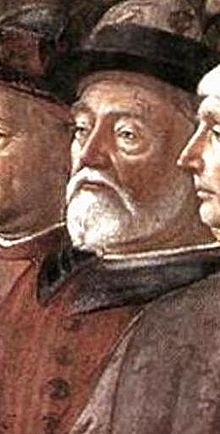
John Argyropoulos
John Argyropoulos | |
|---|---|
 John Argyropoulos as depicted by Domenico Ghirlandaio in 1481 in the Vocation of the Apostles fresco in the Sistine Chapel, Rome.[2][3][4][5] | |
| Born | Ioannis Argyropoulos c. 1415 |
| Died | 1487 |
| Nationality | Greek[6] |
| Education | University of Padua (Theol. Dr., 1444) |
| Era | Renaissance philosophy |
| Region | Western philosophy |
| School | Renaissance philosophy Aristotelianism |
| Institutions | University of Constantinople (1448–1452)[1] Neoplatonic Florentine Academy (1456–70)[1] |
Main interests | Rhetoric, theology |
John Argyropoulos (/ɑːrdʒɪˈrɒpələs/; Greek: Ἰωάννης Ἀργυρόπουλος Ioannis Argyropoulos; Italian: Giovanni Argiropulo; surname also spelt Argyropulus, or Argyropulos, or Argyropulo; c. 1415 – 26 June 1487) was a lecturer, philosopher, and humanist, one of the émigré Greek scholars who pioneered the revival of classical Greek learning in 15th century Italy.[10]

He translated Greek philosophical and theological works into Latin besides producing rhetorical and theological works of his own. He was in Italy for the Council of Florence during 1439–1444, and returned to Italy following the Fall of Constantinople, teaching in Florence (at the Florentine Studium) in 1456–1470 and in Rome in 1471–1487.[1]

Biography
John Argyropoulos was born c. 1415 in Constantinople where he studied theology and philosophy. As a teacher in Constantinople, Argyropoulos had amongst his pupils the scholar Constantine Lascaris. He was an official in the service of one of the rulers of the Byzantine Morea and in 1439 was a member of the Byzantine delegation to the Council of Florence, when they accepted Catholicism and abjured Greek Orthodoxy.[11]

In 1443/4, he received a Doctor of Theology degree from the University of Padua[12] before returning to Constantinople.[13] When the city fell in 1453, he left for the still autonomous Despotate of the Morea in the Peloponnese. In 1456, he took refuge in Italy, where he worked as a teacher in the revival of Greek philosophy as head of the Greek department at Florence's Florentine Studium.[14]

In 1471, on the outbreak of the plague, he moved to Rome, where he continued to act as a teacher of Greek until his death.[15] His students included Pietro de' Medici, Lorenzo de' Medici, Angelo Poliziano, Johann Reuchlin,[16] Jacques Lefèvre d'Étaples and, allegedly, Leonardo da Vinci, although no primary source verifies this claim.[17]

He also made efforts to transport Greek philosophy to Western Europe by leaving a number of Latin translations, including many of Aristotle's works. His principal works were translations of the following portions of Aristotle: Categoriae, De Interpretatione, Analytica Posteriora, Physica, De Caelo, De Anima, Metaphysica, Ethica Nicomachea, Politica; and an Expositio Ethicorum Aristotelis. Several of his writings still exist in manuscript.[15]

He died on 26 June[citation needed] 1487 in Florence, supposedly of consuming too much watermelon.[18]

See also
Notes
- ^ a b c Spyros Panagopoulos, "Higher Education in Byzantium"
- ^ Sleptzoff, L. M. (1978). Men or supermen?: The Italian portrait in the fifteenth century. Magnes Press. p. 68. OCLC 4331192.
Cf. E. Steinmann, Ghirlandaio, Leipzig, 1897, pp. 18-21, and pl. 10 and 13, who recognizes, among the members of the Florentine colony in Rome, Argyropoulos and Giovanni Tornabuoni.
- ^ Burnell, Frederic Spencer (1930). Rome. Longmans, Green & co. p. 217. OCLC 7141638.
We may perhaps recognize, in the group on the right, the bearded head of the famous Greek scholar, Argyropoulos, and, immediately to the left, the wealthy banker, Giovanni Tornabuoni
- ^ Marle, Raimond van; Marle, Charlotte van (1923). The development of the Italian schools of painting, Volume 13. M. Nijhoff. p. 30. OCLC 162830458.
Among the portraits Herr Steinmann has succeeded in recognizing the Greek, Jean Argyropoulos, commentator of Aristotle, who is the old man with a long beard, the papal treasurer, Giovanni Tornabuoni ... he is the clean-shaven man to the right of Argyropoulos while the oldest of the three boys might be Lorenzo, the son of Giovanni Tornabuoni.
- ^ Davies, Gerald Stanley (1909). Ghirlandaio. Methuen and co. p. 53. OCLC 192133437.
Next to him a greybearded man with a flat hat, seen only head and shoulders, is with tolerable certainty recognised as the Greek humanist, Johannes Argyropulos, the translator into Italian of Aristotle. He had been invited by Cosimo dei Medici
- ^ Masters, Roger D. (1999). Fortune Is a River: Leonardo Da Vinci and Niccolo Machiavelli's Magnificent Dream to Change the Course of Florentine History. Plume. p. 55. ISBN 0-452-28090-7.
Cosimo was also a lover and exalter of literary men; he therefore brought Argyropoulos to Florence, a man of Greek birth and very learned for those times, so that Florentine youth might learn from him
; Magnus, Laurie; Boas, Frederick Samuel (1934). A history of European literature. I. Nicholson and Watson. p. 72. OCLC 1614734.Foremost among the interpreters was the Greek, Johannes Argyropoulos, who lectured in Florence to Politian and in Rome to Johann
- ^ James Hankins, Humanism and Platonism in the Italian Renaissance, Volume 1, Ed. di Storia e Letteratura, 2003, p. 207.
- ^ Geanakoplos, Deno J., Constantinople and the West: Essays on the Late Byzantine (Palaeologan) and Italian Renaissances and the Byzantine and Roman Churches, University of Wisconsin Press, 1989, p. 111.
- ^ Christine Raffini, Marsilio Ficino, Pietro Bembo, Baldassare Castiglione: Philosophical, Aesthetic, and Political Approaches in Renaissance Platonism, P. Lang, 1998, p. 21.
- ^ "John Argyropoulos". www.britannica.com. Retrieved 2009-10-02.
John Argyropoulos Byzantine educator born 1415, Constantinople [now Istanbul, Turkey] died June 26, 1487, Rome, Papal States [Italy] Byzantine humanist and active promoter of the revival of Classical learning in the West.
; Doby, Tibor (1963). Discoverers of blood circulation: from Aristotle to the times of da Vinci and Harvey. Abelard-Schuman. p. 252. OCLC 315911202.; Rabil, Albert (1991). Knowledge, goodness, and power: the debate over nobility among quattrocento Italian humanists. Medieval & Renaissance Texts & Studies. p. 197. ISBN 0-86698-100-4.John Argyropoulos (c. 1415-87) played a prominent role in the revival of Greek philosophy in Italy. He came to Italy permanently in 1457 and held
- ^ "John Argyropoulos". www.britannica.com. Retrieved 2009-10-02.
John Argyropoulos Argyropoulos divided his time between Italy and Constantinople; he was in Italy (1439) for the Council of Florence and spent some time teaching and studying in Padua, earning a degree in 1443.
- ^ ; Spyr. P. Lampros, Argyropouleia, published: P.D. Sakellariou, 1910, p. liii.; Jonathan Woolfson, Padua and the Tudors: English Students in Italy, 1485-1603, James Clarke & Co, 1998, p. 4.
- ^ Grendler, Paul F; Renaissance Society of America (1999). Encyclopedia of the Renaissance: Galen-Lyon Volume 3. Scribner's published in association with the Renaissance Society of America. p. 86. ISBN 0-684-80510-3.
Another Greek, John Argyropoulos (1415-1487), received a degree from the University of Padua in 1444 and then returned to Constantinople
- ^ Hancock, Lee (2005). Lorenzo de' Medici: Florence's great leader and patron of the arts. The Rosen Publishing Group. p. 35. ISBN 9781404203150.
He learned Greek from Johannis Argyropoulos (circa 1416-1486), who was the head of the Greek department at the city's university, called Florentine Studium.
; "John Argyropoulos". www.britannica.com. Retrieved 2009-10-02.When Constantinople fell in 1453 he left it for the Peloponnese and in 1456 took refuge in Italy.
; Rabil, Albert (1991). Knowledge, goodness, and power: the debate over nobility among quattrocento Italian humanists. Medieval & Renaissance Texts & Studies. p. 197. ISBN 0-86698-100-4. - ^ a b Chisholm 1911.
- ^ Ivo Volt, Janika Päll (eds.), Byzantino-Nordica 2004, Morgenstern Society, 2005, p. 94.
- ^
- Belozerskaya, Marina (2011). To Wake the Dead: A Renaissance Merchant and the Birth of Archaeology. W. W. Norton & Company. p. 209. ISBN 978-0-393-07284-6.
John Argyropoulos, a renowned translator of Aristotle and the leading expert on ancient mechanics, was a gifted teacher whose pupils would include Lorenzo de' Medici and Leonardo da Vinci.
- Palmer, Allison Lee (2018). Leonardo da Vinci: A Reference Guide to His Life and Works. Rowman & Littlefield. p. 57. ISBN 978-1-5381-1978-5.
He [Da Vinci] first studied with John Argyropoulos...
- Plescau, Ionut Alexandru (2019). "The Byzantine Influence on the Italian Renaissance". LUMEN Proceedings. 12th LUMEN International Scientific Conference Rethinking Social Action. Core Values in Practice RSACVP 2019, 15–17 May 2019, Iasi, Romania. 9: 256–262. doi:10.18662/lumproc.172. ISBN 9781910129210. ISSN 2601-2529.
Another scholar among the Greeks in Florence was Ioannis Argyropoulos (1415-1487). He had famous disciples, both in Constantinople and in Italy. He remains famous for being a master of Leonardo da Vinci for a while.
- Belozerskaya, Marina (2011). To Wake the Dead: A Renaissance Merchant and the Birth of Archaeology. W. W. Norton & Company. p. 209. ISBN 978-0-393-07284-6.
- ^ Harris, Jonathan, The End of Byzantium (Yale University Press, 2011), p. 252.
References
- This article incorporates text from a publication now in the public domain: Chisholm, Hugh, ed. (1911). "Argyropulus, John". . Vol. 2 (11th ed.). Cambridge University Press. pp. 488–489.
- Geanakoplos, Deno J., Constantinople and the West: Essays on the Late Byzantine (Palaeologan) and Italian Renaissances and the Byzantine and Roman Churches, University of Wisconsin Press, 1989, ISBN 0-299-11884-3
- Geanakoplos, Deno J., A Byzantine looks at the Renaissance – Greek, Roman and Byzantine Studies.
- Harris, Jonathan, 'Byzantines in Renaissance Italy', Online Reference Book for Medieval Studies.
- Vassileiou, Fotis & Saribalidou, Barbara, Short Biographical Lexicon of Byzantine Academics Immigrants in Western Europe, 2007, ISBN 978-960-93027-5-3
- Nicholl Charles, Leonardo Da Vinci: The Flights of the Mind, Penguin Books Ltd, 2005, ISBN 0-14-029681-6
- Vassileiou Fotis, Saribalidou Barbara, 'John Argyropoulos teacher of Leonardo da Vinci', Philosophy Pathways, Issue 117, 19 May 2006, International Society for Philosophers
- Migné, Patrologia Graeca volume 158 (documentacatholicaomnia.eu)
External links
- 1410s births
- 1487 deaths
- Argyros family
- Writers from Constantinople
- Constantinopolitan Greeks
- Former Greek Orthodox Christians
- 15th-century Greek philosophers
- Greek Renaissance humanists
- Greek–Latin translators
- Greek Roman Catholics
- Converts to Roman Catholicism from Eastern Orthodoxy
- 15th-century Byzantine writers
- 15th-century Greek writers
- 15th-century Greek educators
- People from Constantinople
- Byzantine diplomats
- People from the Despotate of the Morea
See what we do next...
OR
By submitting your email or phone number, you're giving mschf permission to send you email and/or recurring marketing texts. Data rates may apply. Text stop to cancel, help for help.
Success: You're subscribed now !
